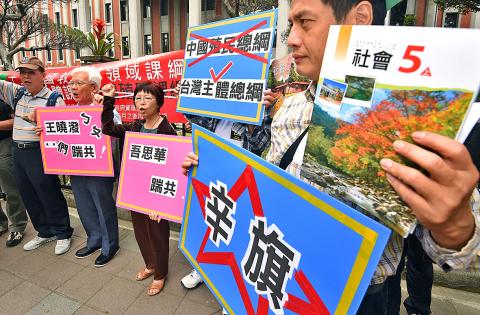In the latest of a series of protests against the high-school curriculum for Chinese language and social science, dozens of civic group representatives yesterday called for Taiwanese to demand the President Ma Ying-jeou (馬英九) administration reverse the policy aimed at “brainwashing” the younger generation.
“Taiwan yes, China no,” protesters shouted outside the Ministry of Education building, which has appealed against the ruling handed down by Taipei High Administration in February that threw into doubt the legitimacy of the ministry’s revisions to the curriculum guidelines in January last year.
The protesters put on a skit to show their dissatisfaction of the weight accorded to the 228 Massacre and the White Terror era in the new version of the curriculum, waving a banner reading: “Taiwanese independence.”

Photo: Liao Chen-huei, Taipei Times
“New curriculum guidelines should be able to stress Taiwan-centered values,” Alliance for Curriculum Guidelines based on Taiwan Subjectivity spokesperson Kuo Yan-lin (郭燕霖) said.
The alliance demanded that Minister of Education Wu Se-hwa (吳思華) push back the date of implementing new curriculum guidelines to June next year and replace “pro-unification academics” on the committee in charge of curriculum review, citing history professor and Cross-Strait Peace and Development Union member Sun Juo-yi (孫若怡).
“There are people who still consider themselves ‘Chinese’ even after living in Taiwan for so long. Less than 3 percent of the nation’s population hold great power that enable them to impose their views on the other 97 percent of Taiwanese,” Taiwan National Party Convener Ted Lau (劉重義) said.
All Taiwanese should fight against the curriculum guidelines attempting to brainwash young people, Lau said.
Alliance of Referendum for Taiwan secretary-general Lee Chuan-hsin (李川信) disputed the ministry’s statement that the revisions made to the guidelines complied with the Republic of China (ROC) Constitution.
The ROC Constitution forced upon Taiwanese by the Chinese Nationalist Party (KMT) regime when it fled to Taiwan in 1949 treated Taiwan as a subordinate under the “one China” framework, Lee said.
“Only by holding a referendum to have the ROC Constitution abolished can problems be resolved,” Lee added.
Taiwan Romanization Association member Wu Li-hui (吳麗慧) said the Ma administration is determined to accomplish its “de-Taiwanization” mission by implementing the new curriculum guidelines and guidelines for other subjects before Ma leaves office in May next year.
The 13 cities and counties governed by the Democratic Progressive Party are considering refusing to adopt the revised curriculum guidelines, while the Taipei City Government, led by Taipei Mayor Ko Wen-je (柯文哲), said that it plans to use the unadjusted curriculum until the ministry resolves the controversy.
Taiwan Independence Reformation Association member Lai Fang-cheng (賴芳徵) called for more students and parents to speak out against the new curriculum guidelines.
Additional reporting by Shih Hsiu-chuan

Chinese Nationalist Party (KMT) Chairman Eric Chu (朱立倫), spokeswoman Yang Chih-yu (楊智伃) and Legislator Hsieh Lung-chieh (謝龍介) would be summoned by police for questioning for leading an illegal assembly on Thursday evening last week, Minister of the Interior Liu Shyh-fang (劉世芳) said today. The three KMT officials led an assembly outside the Taipei City Prosecutors’ Office, a restricted area where public assembly is not allowed, protesting the questioning of several KMT staff and searches of KMT headquarters and offices in a recall petition forgery case. Chu, Yang and Hsieh are all suspected of contravening the Assembly and Parade Act (集會遊行法) by holding

PRAISE: Japanese visitor Takashi Kubota said the Taiwanese temple architecture images showcased in the AI Art Gallery were the most impressive displays he saw Taiwan does not have an official pavilion at the World Expo in Osaka, Japan, because of its diplomatic predicament, but the government-backed Tech World pavilion is drawing interest with its unique recreations of works by Taiwanese artists. The pavilion features an artificial intelligence (AI)-based art gallery showcasing works of famous Taiwanese artists from the Japanese colonial period using innovative technologies. Among its main simulated displays are Eastern gouache paintings by Chen Chin (陳進), Lin Yu-shan (林玉山) and Kuo Hsueh-hu (郭雪湖), who were the three young Taiwanese painters selected for the East Asian Painting exhibition in 1927. Gouache is a water-based

Taiwan would welcome the return of Honduras as a diplomatic ally if its next president decides to make such a move, Minister of Foreign Affairs Lin Chia-lung (林佳龍) said yesterday. “Of course, we would welcome Honduras if they want to restore diplomatic ties with Taiwan after their elections,” Lin said at a meeting of the legislature’s Foreign Affairs and National Defense Committee, when asked to comment on statements made by two of the three Honduran presidential candidates during the presidential campaign in the Central American country. Taiwan is paying close attention to the region as a whole in the wake of a

OFF-TARGET: More than 30,000 participants were expected to take part in the Games next month, but only 6,550 foreign and 19,400 Taiwanese athletes have registered Taipei city councilors yesterday blasted the organizers of next month’s World Masters Games over sudden timetable and venue changes, which they said have caused thousands of participants to back out of the international sporting event, among other organizational issues. They also cited visa delays and political interference by China as reasons many foreign athletes are requesting refunds for the event, to be held from May 17 to 30. Jointly organized by the Taipei and New Taipei City governments, the games have been rocked by numerous controversies since preparations began in 2020. Taipei City Councilor Lin Yen-feng (林延鳳) said yesterday that new measures by